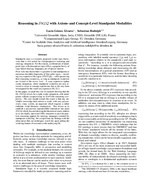Reasoning in SHIQ with Axiom- and Concept-Level Standpoint Modalities
Aus International Center for Computational Logic
Reasoning in SHIQ with Axiom- and Concept-Level Standpoint Modalities
Lucía Gómez ÁlvarezLucía Gómez Álvarez, Sebastian RudolphSebastian Rudolph
Lucía Gómez Álvarez, Sebastian Rudolph
Reasoning in SHIQ with Axiom- and Concept-Level Standpoint Modalities
In Pierre Marquis, Magdalena Ortiz, Maurice Pagnucco, eds., Proceedings of the 21st International Conference on Principles of Knowledge Representation and Reasoning, 383–393, 2024. IJCAI Organization
Reasoning in SHIQ with Axiom- and Concept-Level Standpoint Modalities
In Pierre Marquis, Magdalena Ortiz, Maurice Pagnucco, eds., Proceedings of the 21st International Conference on Principles of Knowledge Representation and Reasoning, 383–393, 2024. IJCAI Organization
- KurzfassungAbstract
Standpoint logic is a recently proposed modal logic framework that is well-suited for multiperspective reasoning and ontology integration. For this reason, combinations of standpoint logic with description logics (DLs), a popular family of logic-based ontology languages, are of special interest.Prior work has shown that it is possible to add standpoints to numerous decidable fragments of first-order logics – including very expressive DLs up to SROIQbs – while preserving their reasoning complexity, so long as standpoint modalities are limited to the axiom level. A more expressive tighter modal integration, where standpoint modalities are also al- lowed to occur in concept expressions, has so far only been investigated for the much less expressive DL EL+.
In this paper, we push this line of research showing that the DL SHIQ allows for a tight modal integration with standpoints without compromising its EXPTIME reasoning complexity. The core insight toward this result is that any satisfiable knowledge base admits a model with only polynomially many worlds, an argument which requires a rather elaborate model-theoretic construction. This allows us to establish a polynomial equisatisfiable translation into plain SHIQ which, beyond showing the theoretical result, enables us to use highly optimised OWL reasoners to provide practical reasoning support for ontology languages extended by standpoint modelling. We complement our findings with the observation that our techniques would fail upon adding the modeling feature of nominals to the underlying DL. - Weitere Informationen unter:Further Information: Link
- Projekt:Project: DeciGUT, ScaDS.AI
- Forschungsgruppe:Research Group: Computational LogicComputational Logic
@inproceedings{{R2024,
author = {Luc{\'{\i}}a G{\'{o}}mez {\'{A}}lvarez and Sebastian Rudolph},
title = {Reasoning in {SHIQ} with Axiom- and Concept-Level Standpoint
Modalities},
editor = {Pierre Marquis and Magdalena Ortiz and Maurice Pagnucco},
booktitle = {Proceedings of the 21st International Conference on Principles of
Knowledge Representation and Reasoning},
publisher = {IJCAI Organization},
year = {2024},
pages = {383{\textendash}393},
doi = {10.24963/kr.2024/36}
}

